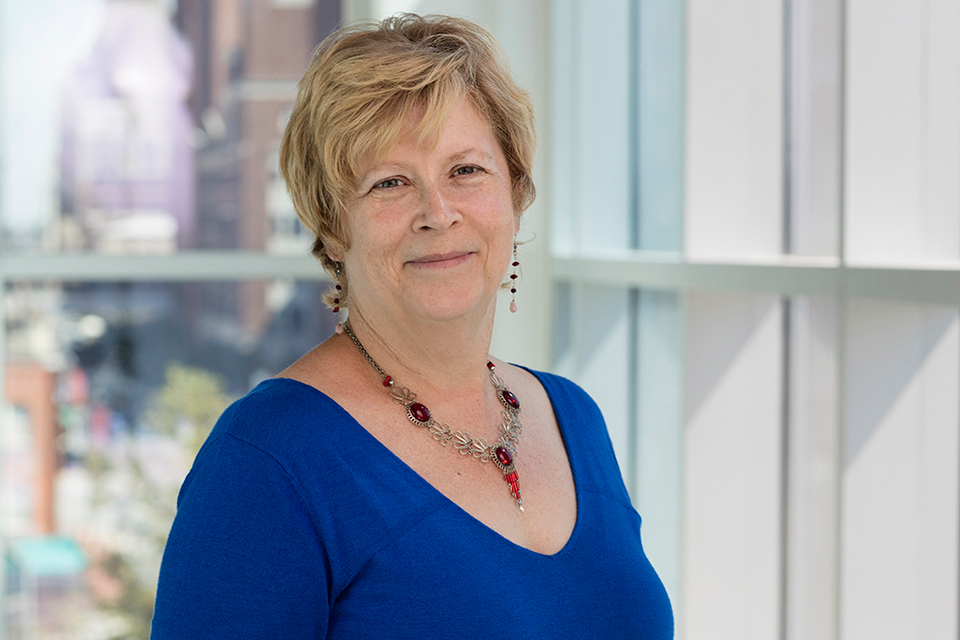Simoni-Wastila Gets Personal During Founders Week Lecture
Celebrated pharmaceutical health services researcher examines how personal passions have helped fuel her remarkable career.

By Malissa Carroll
December 1, 2016
Faculty, staff, and students from across the University of Maryland, Baltimore (UMB) gathered in Pharmacy Hall in early November to listen as Linda Simoni-Wastila, BSPharm, MSPH, PhD, the Parke-Davis Chair in Geriatric Pharmacotherapy in the Department of Pharmaceutical Health Services Research (PHSR) at the University of Maryland School of Pharmacy, delivered the Founders Week Researcher of the Year lecture. A nationally renowned policy and health services researcher, Simoni-Wastila’s research focuses on drug abuse and mental health in vulnerable populations, including the young, the elderly, racial and ethnic minorities, and individuals at risk due to impaired physical and mental health.
“Over the course of her remarkable career, Dr. Simoni-Wastila has carved out a niche in the rapidly expanding area of health policy research,” says Natalie D. Eddington, PhD, FCP, FAAPS, dean and professor of the School of Pharmacy. “Her findings have helped shape both state and federal policy surrounding prescription drug abuse issues, and medication quality in long-term care and in mental health. She is truly deserving of the University’s prestigious Founders Week Researcher of the Year award, and we could not be more proud of all that she has accomplished.”
In a break from traditional lectures focused on methods, statistics, and study findings, Simoni-Wastila spoke about how her personal passions have impacted her research. She took audience members back in time to a project on which she worked that included a “stubborn” set of outliers – data points that seemed detached from or unrelated to the main dataset – and led to an epiphany that forever changed the way she approached her research questions: data points are people.
“Having spent years analyzing data, it had become a medium that I worked with and molded into shape, similar to clay, paint, or cookie dough,” said Simoni-Wastila. “However, after this epiphany, I developed a new respect for outliers and began to realize that my job as a researcher was to translate the data, particularly the outliers, into meaningful findings that benefitted the people that the data represented. I also started to understand that my data told a story, and that it was my responsibility to ensure that others understood that story.”
Explaining that health policies affect not only individuals, but entire populations, Simoni-Wastila also emphasized the importance of incorporating multiple perspectives into research. Using the ongoing prescription drug abuse crisis in the United States as an example, she noted that identifying the right stakeholders is crucial to successful health policy research, as it can help predict the effectiveness of a policy in achieving its intended outcomes.
“Because health policy affects so many people and includes so many stakeholders, it requires multiple perspectives,” said Simoni-Wastila. “To truly understand how policies related to opioid use in this country work, I need to understand the perspectives of numerous stakeholders, including health care professionals, drug enforcement officials, educators, and patients. I cannot do that alone, so I surround myself with brilliant colleagues. I am truly fortunate to be surrounded by people who have as much passion for this work as I do.”
Simoni-Wastila also spoke about subjectivity and bias in research, noting that no research is 100 percent objective. To help illustrate how research is often driven by personal experiences, Simoni-Wastila invited three of her graduate students, including one who recently received his doctorate, to speak about their research and journeys in the PhD in PHSR program during her lecture.
“Growing up in Zimbabwe, I witnessed first-hand how a lack of resources and access to affordable health care can affect public health,” said Patience Moyo, a graduate student in the PhD in PHSR program. “I now strive to learn all that I can about improving health systems and quality of care so that I can pay it forward and help make a difference and improve health care for the people in Zimbabwe, as well as people in other countries that lack access to quality health systems and care.”
To end her lecture, Simoni-Wastila described the untraditional path that she took to become a policy and health services researcher. She noted that, as the daughter of a nurse and a pharmacologist, she always knew that she would pursue a career in health care, though the field of public health did not enter her life until her last summer as a pharmacy student, when she had an opportunity to participate in the Commissioned Officer Student Training and Extern Program (COSTEP) with the U.S. Public Health Service.
“That experience not only introduced me to epidemiology and showed me how diseases could be tracked and characterized, but also helped me understand that the health care system that most of us take for granted simply does not work for everyone,” said Simoni-Wastila, who enrolled in a Master of Science in Public Health program the following year and later completed her doctorate in health policy. “The idea of understanding and potentially treating health problems in large numbers of people and populations was intriguing and seemed as important a modality as treating patients one at a time.”
Reinforcing her assertion of the personal motivations that often influence research, she concluded, “As a researcher, I am what I know. My past informs both my present and my future. I research what I experience and I do so with intent and purpose. I am subjective with my research goals, and I hope you are, too.”

